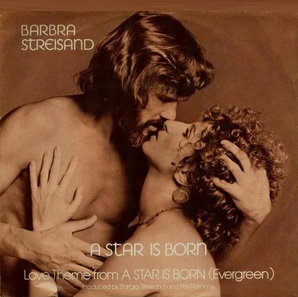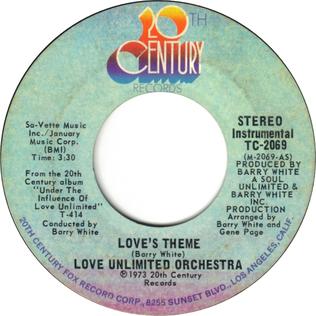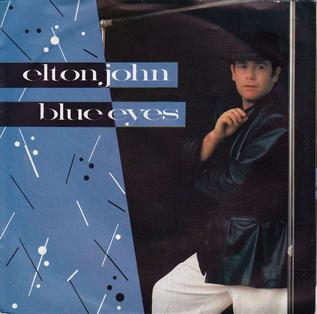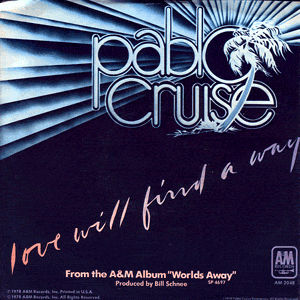Joey Scarbury is an American singer and songwriter best known for his hit song, "Theme from The Greatest American Hero", in 1981.

Mike Post is an American composer, best known for his television theme music for various shows, including The White Shadow; Law & Order; Law & Order: Special Victims Unit; The A-Team; The Byrds of Paradise; NYPD Blue; Renegade;The Rockford Files; L.A. Law; Quantum Leap; Magnum, P.I.; and Hill Street Blues. He was also the producer of the Van Halen III album by the band Van Halen.

"Just the Way You Are" is a song by Billy Joel from his fifth studio album The Stranger (1977), released as the album's second single in early November 1977. It became both Joel's first US Top 10 and UK Top 20 single, as well as Joel's first Gold single in the US. The song also topped the Billboard Easy Listening Chart for the entire month of January 1978.

"If" is a song written by American singer-songwriter David Gates in 1971. Originally popularized by his group Bread, "If" charted at No. 4 on the U.S. Billboard Hot 100 when released as a single in 1971 and No. 6 in Canada. It also spent three weeks at No. 1 on the U.S. Easy Listening chart, and one week at the top of the Canadian AC chart.

"9 to 5" (or "Morning Train") is a song by Sheena Easton from 1981 album Take My Time. It was written by British songwriter Florrie Palmer and recorded and released as single in 1980, becoming Easton's biggest hit. It peaked at number three in the United Kingdom in August 1980 and was certified gold. In February 1981, it was released in the United States and Canada under the title "Morning Train (Nine to Five)" to avoid confusion with Dolly Parton's recent hit "9 to 5". It reached number one in both countries, becoming Easton's only chart-topper in those nations.

"Nobody Does It Better" is a power ballad and the theme song for the James Bond film The Spy Who Loved Me (1977). Composed by Marvin Hamlisch with lyrics by Carole Bayer Sager, the song was produced by Richard Perry and performed by Carly Simon. It was the first Bond theme song to be titled differently from the name of the film since Dr. No (1962), although the phrase "the spy who loved me" is included in the lyrics. The song was released as a single from the film's soundtrack album, and became a major worldwide hit.

"Evergreen" is the theme song from the 1976 film A Star Is Born. It was composed and performed by American singer, songwriter, actress and director Barbra Streisand with lyrics by Paul Williams, and arranged by Ian Freebairn-Smith. The song was released on the soundtrack album to A Star Is Born.

"Tired of Toein' the Line" is a song by Rocky Burnette, who co-wrote it with Ron Coleman, former bass player of the Brothers Grim and the Everly Brothers.

"Being with You" is a 1981 song recorded by American singer Smokey Robinson. The song spent five weeks at No. 1 on the Hot Soul Singles chart from March to early May 1981 and reached number two on the Billboard Hot 100, behind "Bette Davis Eyes" by Kim Carnes, his highest charting solo hit on the Billboard pop charts. It also reached number one in the UK Singles Chart.

"Tell It Like It Is" is a song written by George Davis and Lee Diamond and originally recorded and released in 1966 by Aaron Neville. In 2010, the song was ranked No. 391 on Rolling Stone magazine's list of The 500 Greatest Songs of All Time.

"Working My Way Back to You" is a song made popular by the Four Seasons in 1966 and the Spinners in 1980.

"Love's Theme" is an instrumental piece written by Barry White around 1965. Recorded and released as a single by White's Love Unlimited Orchestra in 1973, it was one of the few instrumental and purely orchestral singles to reach #1 on the Billboard Hot 100 chart in the United States, which it did in early 1974. Billboard ranked it as #3 on the Year-End Hot 100 singles of 1974.

"Blue Eyes" is a song performed by English musician Elton John with music and lyrics written by John and Gary Osborne. It was released in 1982, as the UK lead single from John's 16th studio album, Jump Up! (1982). It was released as the album's second single in the US. It hit No. 8 in the UK; in the US, it spent three weeks at No. 10 on the Cash Box chart, went to No. 12 on the Billboard Hot 100, and spent two weeks at No. 1 on the Billboard AC chart. John performed this song often in his concerts until 2012.

"A Beautiful Morning" is a song written by Felix Cavaliere and Eddie Brigati and recorded by the Rascals. Coming out in early 1968, it was the group's first track released after shortening their name from the Young Rascals. The single was one of the earliest released in stereo, as 7-inch singles generally were in mono. Together with the Doors "Hello, I Love You", it's credited with changing the industry standard of singles.

"Lonely Night (Angel Face)" is a song written by Neil Sedaka. The song was first recorded by Sedaka and appeared as a track on his 1975 studio album, The Hungry Years. The following year the song was made popular when covered by the pop music duo Captain & Tennille, who took their version to number 3 on the Billboard Hot 100.

"Love Will Find a Way" is a single released by American rock group Pablo Cruise from the album Worlds Away in May 1978. On the Billboard Hot 100, "Love Will Find a Way" peaked at number 6.

"The Beach Boys Medley" is a single containing a medley of popular Beach Boys songs from the 1960s, edited by John Palladino. Released in mid-1981, it capitalized on a medley craze begun by the Stars on 45 medleys. "The Beach Boys Medley" reached number 12 on the Billboard Hot 100, becoming the band's highest-charting hit in the United States in over five years. The single peaked at number 8 on the Cash Box sales chart. It also reached number 4 in New Zealand. "The Beach Boys Medley" was first released on an album a year later in 1982 on Sunshine Dream.

"Stand Tall" is the title of an international hit single by Burton Cummings, taken from his eponymous debut album. The song was released less than two years after "Dancin' Fool", the final hit single by the group for which Cummings had been lead singer, The Guess Who.

"Really Wanna Know You" is a 1981 song by Gary Wright that was a hit single in the U.S., reaching No. 16 on the Billboard Hot 100. It was taken from the album The Right Place. The song spent 17 weeks on the chart and became Wright's third biggest U.S. hit. It was his final charting single.

"Could You Ever Love Me Again" is a 1973 song recorded by Gary and Dave. It became their greatest hit, reaching #7 in Australia and #1 in Canada. It was also a minor hit in the United States.



















